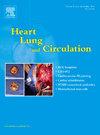临床医生对高质量心源性休克护理障碍和促进因素的看法:一项焦点小组研究。
IF 2.2
4区 医学
Q2 CARDIAC & CARDIOVASCULAR SYSTEMS
引用次数: 0
摘要
背景与目的:心源性休克是一种与高死亡率相关的医学急诊。这是一种资源密集和昂贵的疾病,并伴有合并症和临床恶化。然而,从澳大利亚临床医生的角度来看,质量心源性休克护理的障碍和推动因素相对未知。本研究旨在i)探讨临床医生对心源性休克患者提供这些最佳实践护理和最佳结果的障碍的看法;ii)了解克服这些障碍的优先事项,目的是利用研究结果为心源性休克管理临床试验的开发和实施提供信息——ESCAPE-CS:评估提高心源性休克公平性和结果的标准化临床途径(ESCAPE-CS)。方法:通过视频会议与经验丰富的临床医生进行定性焦点小组研究,录音并逐字转录。数据分析采用NVivo专题分析。结果:进行了5个焦点小组,包括19名参与者(11名男性和8名女性),包括7名重症监护室医生、7名护士顾问/教育工作者、3名心脏病专家和2名在大都市和农村、地区或偏远医疗机构工作的急诊科医生。结论:本研究为心源性休克患者提供最佳实践护理和最佳结果的障碍和可能的推动因素提供了重要的见解。心源性休克管理的护理模式有待改进,以解决多因素复杂性带来的不平等。本文章由计算机程序翻译,如有差异,请以英文原文为准。
Clinician Perspectives of Barriers and Enablers to Quality Cardiogenic Shock Care: A Focus Group Study
Background & Aim
Cardiogenic shock is a medical emergency that is associated with high mortality rates. It is a resource-intensive and costly condition that is complicated by comorbidities and clinical deterioration. However, the barriers and enablers to quality cardiogenic shock care are relatively unknown from the perspective of Australian clinicians. This study aimed to i) To explore clinicians’ perspectives on the barriers to delivering these best practice care and optimal outcomes for patients with cardiogenic shock; and ii) To understand priorities to overcome these barriers, with the intent of using the findings to inform the development and implementation of a clinical trial for cardiogenic shock management—ESCAPE-CS: Evaluation of a Standardised ClinicAl Pathway to improve Equity and outcomes in Cardiogenic Shock (ESCAPE-CS).
Method
A qualitative focus group study was conducted via videoconference with experienced clinicians, and audio-recorded and transcribed verbatim. Data were analysed using thematic analysis in NVivo.
Results
Five focus groups were conducted, including 19 participants (11 male and eight female), comprising seven intensive care unit physicians, seven nurse consultants/educators, three cardiologists, and two emergency department physicians working in metropolitan and rural, regional, or remote health settings. Five themes were identified:
- 1)Referral and retrieval pathways and systems;
- 2)The importance of clinical recognition and response to deterioration;
- 3)Geographical differences in resources and expertise;
- 4)Increased inter-disciplinary collaborations; and
- 5)The use of guidelines, data, and protocolised care and technologies.
Conclusions
This study provided critical insights into the barriers and possible enablers to delivering best practice care and optimal outcomes for patients with cardiogenic shock. There is scope for an improved model of care in cardiogenic shock management to address inequalities emerging from multifactorial complexities.
求助全文
通过发布文献求助,成功后即可免费获取论文全文。
去求助
来源期刊

Heart, Lung and Circulation
CARDIAC & CARDIOVASCULAR SYSTEMS-
CiteScore
4.50
自引率
3.80%
发文量
912
审稿时长
11.9 weeks
期刊介绍:
Heart, Lung and Circulation publishes articles integrating clinical and research activities in the fields of basic cardiovascular science, clinical cardiology and cardiac surgery, with a focus on emerging issues in cardiovascular disease. The journal promotes multidisciplinary dialogue between cardiologists, cardiothoracic surgeons, cardio-pulmonary physicians and cardiovascular scientists.
 求助内容:
求助内容: 应助结果提醒方式:
应助结果提醒方式:


